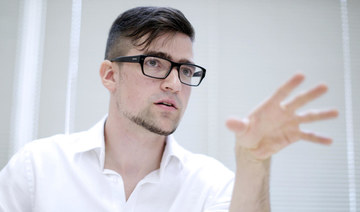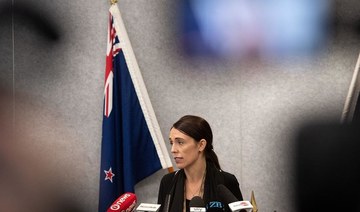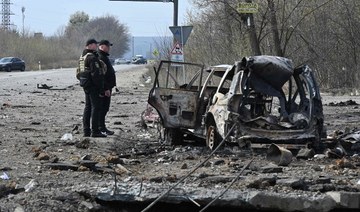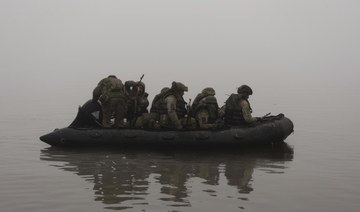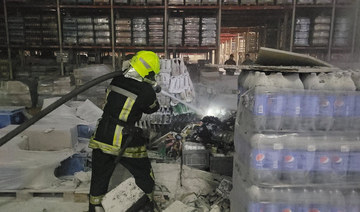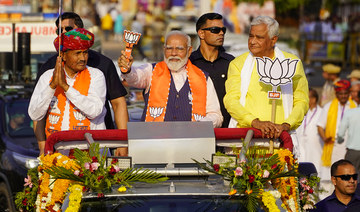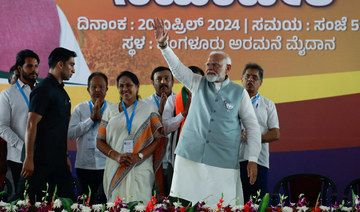WELLINGTON, New Zealand: When the gunman began to attack the Al Noor mosque, Ahmed Alayedy scrambled to get to the nearest emergency exit. He was the first one there.
“I tried to open the door,” he said. “But it doesn’t open.”
Alayedy and other survivors of the March 15 mosque attacks in New Zealand have described to The Associated Press a scene of confusion and terror at the door on one side of the main prayer room, in the first accounts of the role the door played.
Alayedy said so many people began crushing him against the door that some of his ribs cracked. Another survivor, Khaled Alnobani, says he thinks as many as 17 people may have died trying to get out through the door.
Investigators have likely examined a new electric locking system installed on the door in the days before the attack. The mosque says an electrician disabled that system the day before the attack, although some of those who escaped question whether that was the case. What is clear is that nobody managed to open the door that afternoon.
With the gunman in the middle of the room, the door represented the only escape route for those on one side of him, at least until people started smashing windows to get out.
Fifty people were slaughtered by the gunman at two Christchurch mosques during the attack, including 42 who died at Al Noor. Alayedy and others say that if the door had been wide open like it typically was during Friday prayers, many more people might have escaped.
Shagaf Khan, the president of the Muslim Association of Canterbury which oversees the mosque, said the door was closed and latched much like the front door of a house. He said it wasn’t locked, although worshippers may have believed it was in the confusion.
He said an electrician had tested the new electric locking system on Thursday, and then disengaged it for Friday prayers. He said that to open the door, somebody needed to turn a lever. It was just happenstance, and perhaps the cool weather that day, he said, which meant the door wasn’t wide open as usual.
“On any other Friday, the door would be open,” he said. “But on this Friday, nobody opened that door.”
He said he agreed that more people would have escaped if the door had been open.
“If it had been completely open, it would have been easy for people to get out,” he said. “But nobody was prepared for this. We were prepared for an emergency like a fire or an earthquake, and people would still have time to get out. This is something totally different. You don’t put this in your emergency plan.”
Alayedy said that in the confusion, he can’t be sure if he simply failed to turn the lever properly or if something else stopped the door from opening.
Alnobani, said he, too, tried to open the door and it didn’t work, and he’s familiar with the lever. He said he believes the door was electronically locked. Simply pushing a button next to the door would have unlocked it, he said, but nobody knew about the new system.
Khan said the mosque was in compliance with regulations, which require emergency exits to be clear from objects, easily accessible, and unlocked.
Police said the scene examination is part of their investigation and they will not be commenting while the investigation is ongoing.
Robert Wright, the Christchurch City Council head of building consents, said in an email the mosque was in compliance with the Building Act at the time of the attacks and had a valid certificate known as a “Building Warrant of Fitness.”
Alayedy, 30, said that on the day of the attack, he’d been listening to a holy speech by imam Gamal Fouda when he heard six or seven shots. He thought it was an electrical fault at first but then heard screaming and ran for the door.
“All the brothers come in behind each other, on top of each other,” he said.
Because he couldn’t open the door, he said, he tried punching the hexagonal piece of glass in the lower part of the door. When that didn’t work, he drove his knee through it, shattering the glass, and then kicked it out. He crawled through and ran for safety.
Alayedy, a chef from Jordan who moved to New Zealand nine years ago, said he thought about his family back at their house as he ran. His pregnant wife, his 3-year-old son, and the baby daughter they hope to have within the next couple of weeks.
Behind the mosque, Alayedy said, he began helping people to escape over a fence but couldn’t get over it himself because of his injured ribs.
Another survivor provided a second escape route near the door by diving through a window with his arm wrapped around his eyes. Tarik Chenafa said he heard a tat-tat-tat-tat-tat and knew right away it was a semi-automatic weapon from his two years of compulsory military training in the Algerian army.
“I know someone is coming to kill us,” he said.
Alnobani said that when he first came to the mosque that Friday, he’d noticed the side door was shut and considered opening it but then saw there were some older worshippers. It was a little cold and windy outside, he figured, so he left it alone.
Alnobani said he also managed to crawl through the door’s smashed glass and run. He returned to help rescue a young boy whose father was shoving him through the opening, he said, and then helped the father as well.
“I tried to save the child, and I thought maybe I lose my life,” he said. “But I am just alone,” he said, adding “He had more than me to lose.”
When he tried to help a third person through the opening, Alnobani said, that man was shot. The gunman walked out of the mosque to get another gun from his car, Alnobani said, and began shooting at him when he returned. But he managed to escape, and then drove two injured people to the hospital.
The gunman acted quickly, mowing down people on both sides of the mosque. On the side opposite from the closed door, some worshippers were able to escape, but the gunman also killed many others as they tried to leave.
“And he was actually standing behind them, and he was shooting and shooting and shooting and shooting,” Fouda, the imam, told the AP after the attack. “Tragedy. Tragedy.”
Brenton Tarrant, a 28-year-old Australian, has been charged with murder in the attack. His next court appearance is scheduled for April 5.
Chenafa said he’s still sad and confused, and finds it hard to sleep. And he doesn’t know what to believe about the door.
“There will be a lot of waiting to find out the truth,” he said.
‘It doesn’t open’: Mosque survivors describe terror at door
‘It doesn’t open’: Mosque survivors describe terror at door
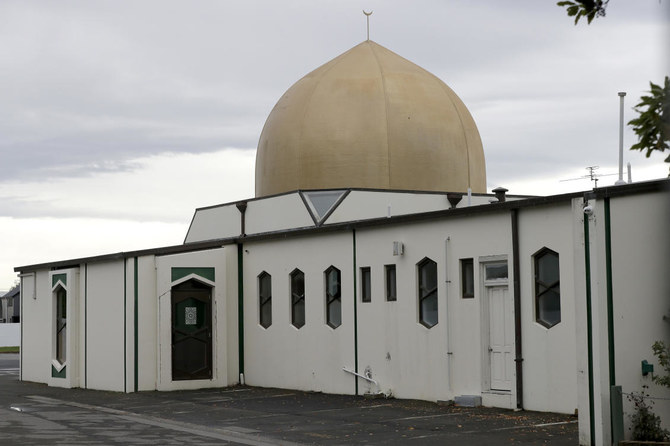
- Investigators have likely examined a new electric locking system installed on the door in the days before the attack
- Fifty people were slaughtered by the gunman at two Christchurch mosques during the attack, including 42 who died at Al Noor
Sweden to send NATO troops to Latvia next year: PM
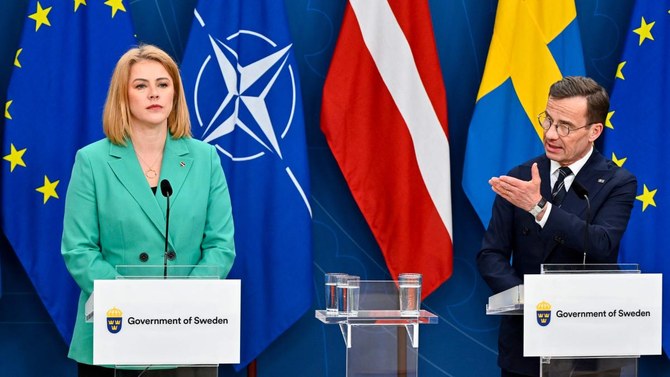
- The Swedish troop contribution was the first to be announced since the Scandinavian country joined NATO in March
- The battalion would be comprised of around 400 to 500 troops
STOCKHOLM: Sweden will next year contribute a reduced battalion to NATO forces in Latvia to help support the Baltic state following Russia’s invasion of Ukraine, Prime Minister Ulf Kristersson said Thursday.
The Swedish troop contribution was the first to be announced since the Scandinavian country joined NATO in March.
Kristersson had in January announced that Sweden would likely send a battalion to take part in NATO’s permanent multinational mission in Latvia, dubbed the Enhanced Forward Presence, aimed at boosting defense capacity in the region.
“The government this morning gave Sweden’s armed forces the formal task of planning and preparing for the Swedish contribution of a reduced mechanized battalion to NATO’s forward land forces in Latvia,” Kristersson told reporters during a press conference with his Latvian counterpart Evika Silina.
He said the battalion, which will be in Latvia for six months, would be comprised of around 400 to 500 troops.
“Our aim is a force contribution, including CV 90s armored vehicles and Leopard 2 main battle tanks.”
“We’re planning for the deployment early next year after a parliament decision,” he said.
UK police make fourth arrest after migrant deaths off France
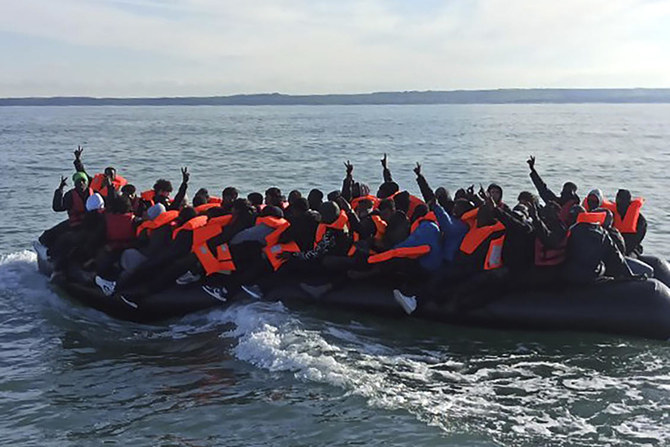
- NCA said it arrested an 18-year-old from Sudan late Wednesday on suspicion of facilitating illegal immigration and entering the UK illegally
- The latest arrest took place at Manston in Kent, southeast England, and the suspect was taken into custody for questioning
LONDON: UK police said Thursday that they had arrested another man after five migrants, including a child, died this week trying to cross the Channel from France.
The National Crime Agency (NCA) said it arrested an 18-year-old from Sudan late Wednesday on suspicion of facilitating illegal immigration and entering the UK illegally.
The arrest came as part of an investigation into the Channel small boat crossing which resulted in the deaths of five people on a French beach on Tuesday.
The NCA detained two Sudanese nationals aged 19 and 22, and a South Sudan national, also 22, on Tuesday and Wednesday, also on suspicion of facilitating illegal immigration and entering the UK illegally.
The 19-year-old has been released without charge, and is now being dealt with by immigration authorities, said the NCA.
The latest arrest took place at Manston in Kent, southeast England, and the suspect was taken into custody for questioning.
Three men, a woman and a seven-year-old girl lost their lives in the early hours of Tuesday in the sea near the northern French town of Wimereux.
They had been in a packed boat that set off before dawn but whose engine stopped a few hundred meters from the beach.
Several people then fell into the water. About 50 people were rescued and brought ashore but emergency services were unable to resuscitate the five.
Fifteen people have died this year trying to cross the busy shipping lane from northern France to southern England, according to an AFP tally.
That is already more than the 12 who died in the whole of last year.
Belgium summons Israeli ambassador over aid worker’s death
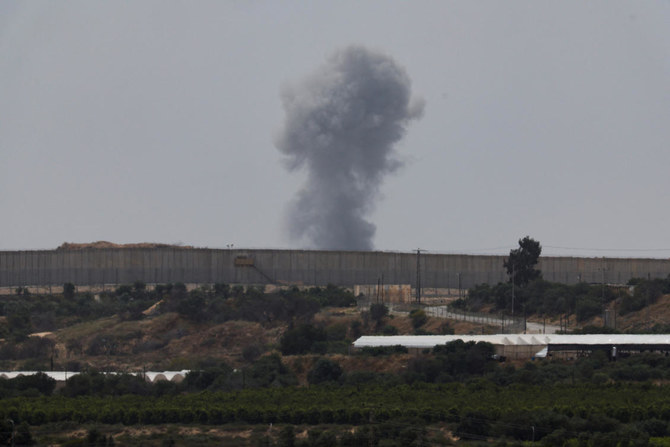
- Abdallah Nabhan, 33, along with his seven-year-old son, 65-year-old father, 35-year-old brother and six-year-old niece, were killed in Israel strike
- The airstrike hit the family home where 25 people were sheltering
BRUSSELS: Belgium said Thursday that it would summon Israel’s ambassador to explain the death in a Gaza airstrike of an aid worker with its Enabel development agency, as well as members of his family.
“Bombing civilian areas and populations is contrary to international law. I will summon the Israeli ambassador to condemn this unacceptable act and demand an explanation,” Foreign Minister Hadja Lahbib said on X.
Enabel said in a statement that Abdallah Nabhan, 33, along with his seven-year-old son, 65-year-old father, 35-year-old brother and six-year-old niece, were killed “after an Israeli airstrike in the eastern part of the city of Rafah.”
An Enabel employee & his family have been killed in Gaza. We express our solidarity with his family & colleagues.
— Hadja Lahbib (@hadjalahbib) April 25, 2024
Bombing civilian areas & populations is contrary to international law. I will summon the Israeli ambassador to condemn this unacceptable act & demand an explanation.
The airstrike hit the family home where 25 people were sheltering, including people displaced by the Israeli military operation in Gaza, Enabel said.
It said that Nabhan, who had worked on a Belgian development project helping young people find jobs, and his family were on a list Israel had of people eligible to exit Gaza, but that they were killed before being granted permission to leave.
Enabel’s chief, Jean Van Wetter, called their deaths “yet another flagrant violation by Israel of international humanitarian law.”
The health ministry in Gaza, run by the Hamas militant group, says more than 34,000 people have died in the war being waged in the Palestinian territory, most of them women and children.
Israel is conducting airstrikes and ground operations there in retaliation for a Hamas attack on October 7 that killed around 1,170 people in Israel, according to an AFP tally of Israeli figures.
Belgium, which currently holds the EU presidency, is among the European countries most vocal in condemning Israel’s operation as disproportionately deadly for Palestinian civilians.
Ukraine, Russia exchange fire, at least seven dead
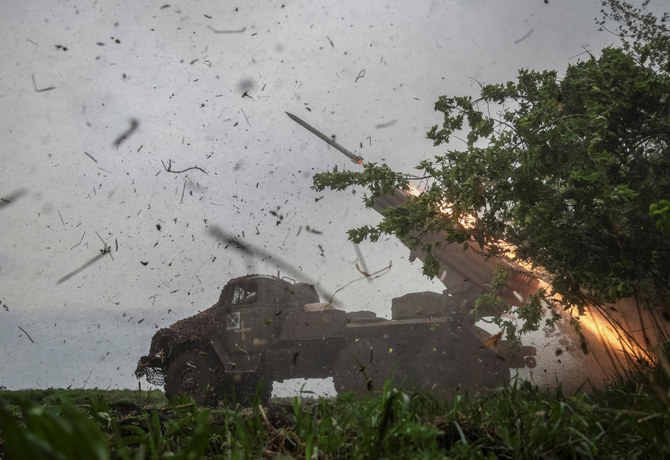
- The uptick in civilian deaths came as Russian forces are pressing in hard in the eastern Donetsk region of Ukraine
- A Ukrainian attack drone left two dead in Zaporizhzhia and two more were killed by Ukranian artillery fire in Kherson
MOSCOW: Ukrainian and Russian forces exchanged drone and artillery fire on Thursday, leaving at least seven dead, regional officials on both sides of the frontline announced.
The uptick in civilian deaths came as Russian forces are pressing in hard in the eastern Donetsk region of Ukraine, ahead of events in Moscow on May 9, hailing the Soviet Union's victory in World War II.
A Ukrainian attack drone left two dead in the southern region of Zaporizhzhia and two more were killed by Ukranian artillery fire in the southern Kherson region, officials said.
The Kremlin claimed to have annexed both regions in late 2022 even though Russian forces are still battling to gain full control over them.
"A man and a woman were killed as a result of a strike on a civilian car. Their four young children were orphaned," the Russian-installed head of Zaporizhzhia, Evgeny Balitsky, wrote on social media.
He said the children would be taken into care and provided with psychological assistance.
The Russian head of the Kherson region, Vladimir Saldo, said separately that two more people were killed by Ukrainian fire in the village of Dnipryany.
The two frontline regions saw intense bouts of fighting in 2022 and the summer of 2023, when Ukraine launched a counteroffensive that failed to meet expectations in Zaporizhzhia.
The brunt of the fighting has since moved to the eastern Donetsk region, which is also claimed by Moscow as Russian territory.
The Ukrainian head of the Donetsk region, Vadim Filashkin, said three people had been killed in separate bouts of shelling in the villages of Udachne, where two people were killed, and in Kurakhivka, where one person was killed.
"The final consequences of the shelling have yet to be determined," he said.
Keralites in Gulf take ‘vote flights’ to join India’s mammoth polls
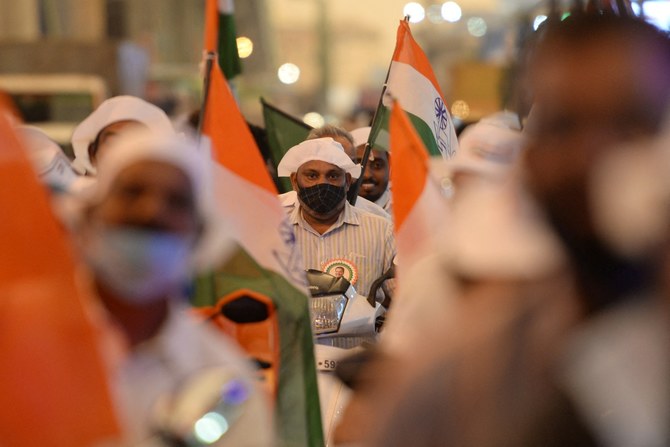
- ‘Vote flights’ are special chartered flights bringing Keralites home to cast ballots
- Kerala is the single main place of origin of Indian expats living in Gulf countries
NEW DELHI: Tens of thousands of Keralites working in Gulf countries are flying home to cast their ballots as the southern Indian state opens for voting on Friday in the world’s biggest general election.
India’s seven-phase polls started on April 19 and take place over the next six weeks, with more than 968 million people registered to vote.
Some states are completing the process in a day, and others have it spread out in several phases. Kerala is joining other 12 states, which according to the schedule go to the polls on April 26.
Indian nationals living overseas have been allowed to vote since 2011 and have to register with both the Election Commission of India and Indian embassies in their countries of residence. Their names will then appear on the voters’ list, but to cast their ballots, they still need to be physically present in their constituencies.
India has one of the world’s largest diasporas, especially in GCC countries, where at least 9 million Indian expats live and work. The southwestern coastal state of Kerala is the single main place of their origin. Some 3.5 million Keralites reside in Saudi Arabia, Oman, Kuwait, Qatar, Bahrain and the UAE.
“I think about 30,000 people have come from Saudi Arabia alone to vote. Not all of them have come on ‘vote viman’ (vote flights). Some have also come by regular flights,” said Iqbal Cheri, a marketing professional working in Dammam, who reached Kerala on Thursday.
Cheri referred to the flights that have been bringing citizens home to participate in Friday’s polls.
“They bring voters only and they are mostly chartered flights,” he said. “We have come here to vote and save our democracy and secularism. It’s an important election and we all need to vote to save the nation.”
His compatriot, Shareef Chola Paramdil, who works as a marketing head of a hospital in Dammam, said these election flights have been bringing Saudi Arabia-based Kerala voters home for the past few days.
“Last week, also three chartered flights came from Saudi Arabia,” he said.
“People who come on the chartered flights pay less compared to the regular flights, as group booking brings down the fare. Besides, these people don’t get more than a few days of leave. So, they come and cast their votes and leave the next day.”
There are 543 contested seats in the lower house of parliament. The party or coalition that wins at least 272 is going to form the government. The state of Kerala will contribute 20.
For Paramdil, the election is particularly important as a Muslim because incumbent Prime Minister Narendra Modi and his ruling Bharatiya Janata Party have been accused by the opposition and minority groups of marshaling majoritarian Hindu sentiment.
Critics say that India’s tradition of diversity and secularism has been under attack since Modi took power a decade ago and that his party has been fostering religious intolerance and discrimination.
“We want a government that does not discriminate in the name of religion, and we have been troubled by the politics of division that the government in Delhi has been practicing ever since it came to power in 2014,” Paramdil said.
Both Keralite Muslims and Hindus — like Gokul Padnabhan, a Kuwait-based professional in the oil and gas industry — see the election as an important exercise of their democratic rights.
“It’s very important to be here this time. That’s why I came for the vote,” Padnabhan said. “The vote will help us find the right person to rule us for the next five years.”
One of the organizations helping expat voters charter flights in Gulf countries is the Kerala Muslim Cultural Centre, an overseas wing of the Indian Union Muslim League.
“I feel around 100,000 people have come from the Gulf region to vote in this election,” said Ahamed Saju, head of the IUML’s student federation.
“Why they came is because this is a very crucial election this time ... Each and every vote is important. So, they thought that this time to protect our democracy, protect our constitution, protect our values and protect our secular credentials and the secular fabric of the country.”




